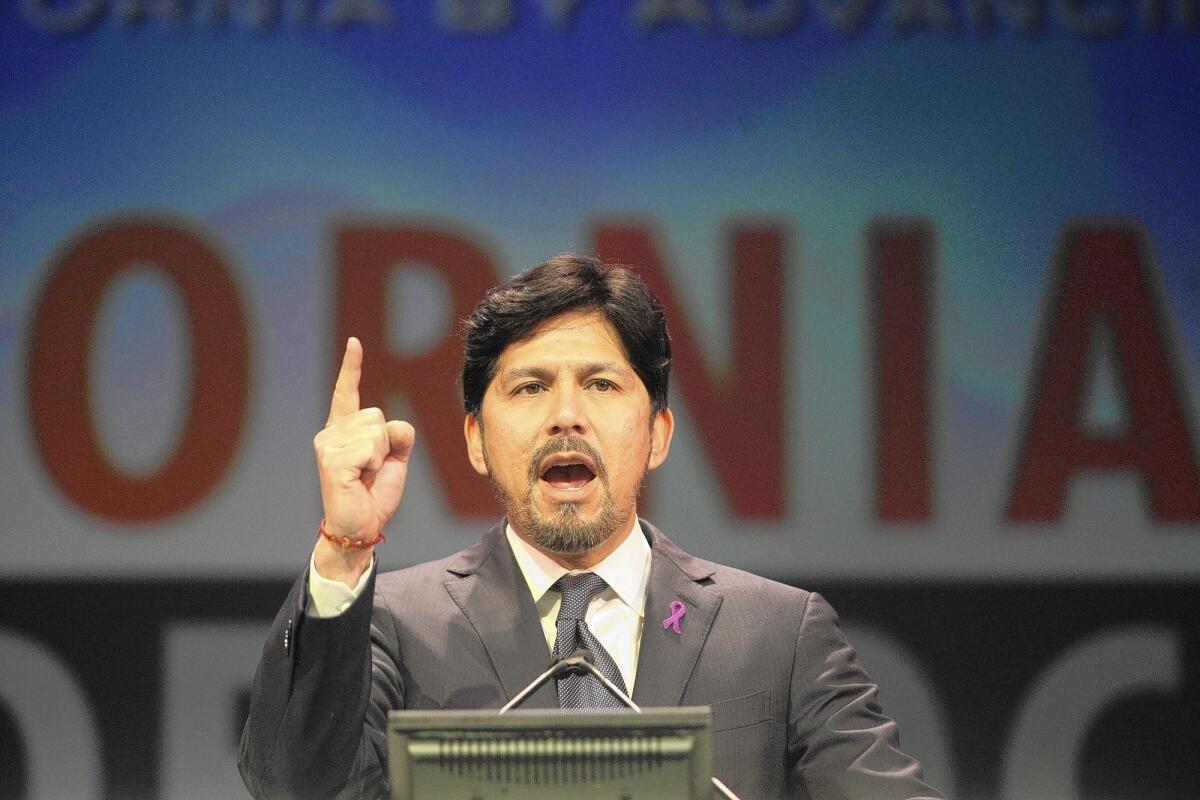Tougher ethics rules advance in California Senate committee

SACRAMENTO — A raft of bills to set tougher ethics rules for California politicians cleared their first legislative hurdle Tuesday as the state Senate prepared for a daylong refresher course on standards of conduct.
Lawmakers say better adherence to existing rules and tougher restrictions in the future are needed to win back the public’s trust after three state senators were charged with crimes.
Eleven proposals approved by a Senate committee included a ban on fundraising during the end of legislative sessions, when decisions on many key issues are made; a reduction in the value of gifts that officials may accept; and a prohibition on such items as spa treatments, golf games, concert and professional sports tickets, theme park admissions and gift cards.
Lawmakers also moved to double the frequency of public disclosures about funds raised and spent.
“These common-sense reforms are needed to bolster the public’s confidence in elected officials,” said Sen. Kevin de León (D-Los Angeles), a member of a group of lawmakers that drafted the measures.
The bills, which would affect state officials, face other committee reviews before possible votes on the floor of the Senate and Assembly.
Sen. Alex Padilla (D-Pacoima) proposed the blackout period for fundraising by legislators, to begin 100 days before the end of each session and last until seven days after.
Good-government groups complain that lawmakers collect money from special interests just before and after voting on many bills that affect contributors.
“The blackout period would be in place during critical budget votes and at the end of the legislative session,” said Padilla, who is running for secretary of state — a race that has focused on political ethics following the corruption scandals.
“This is a period when the fundraising blackout would have the greatest impact,” he said.
One of Padilla’s rivals in the race is Dan Schnur, an educator and former head of California’s political ethics watchdog. Schnur told the committee the bill should bar fundraising during the entire legislative year.
A measure by Sen. Ricardo Lara (D-Bell Gardens) would require campaign expenses and fundraising reports to be filed with the state every three months to better show the public who is influencing elections.
Currently, some reports in nonelection years are filed twice a year. A different bill, by Padilla, would require certain contributions to be reported within five days.
The Senate Elections and Constitutional Amendments Committee also approved a measure that would prohibit elected officials from contributing campaign funds to nonprofits owned or operated by family members, ban politicians from using campaign funds to pay their own criminal defense expenses and limit travel expenses officials may accept from others to $5,000.
The bill, by Sen. Jerry Hill (D-San Mateo), was supported by open-government activists including Sarah Swanbeck of California Common Cause and Trudy Schafer of the League of Women Voters of California.
“There is a public perception that the Legislature is corrupt,” Schafer said, adding that the bill “will decrease that perception.”
Lawmakers also approved a potential ban on political fundraisers for state officials in the homes of lobbyists, closing a loophole in a rule prohibiting lobbyists from giving gifts of more than $10 per month to elected officials.
Lobbyist Kevin Sloat and his firm were recently hit with $133,500 in fines for providing expensive wine, cigars and liquor to about 40 politicians at fundraisers held in Sloat’s Sacramento home.
The bills advanced a month after the Senate suspended Democratic Sens. Roderick D. Wright, who represents an Inglewood district, Leland Yee of San Francisco and Ronald S. Calderon of Montebello. A jury convicted Wright of lying about living in his district; Yee and Calderon have been indicted on federal corruption charges.
Senate President Pro Tem Darrell Steinberg (D-Sacramento) has canceled committee meetings for Wednesday so senators and staff members can attend sessions on existing ethics rules.
Robert Stern, former general counsel of the state’s ethics agency, said the true test of lawmakers’ intentions would be whether the stricter laws pass the entire Legislature and head to the governor for his signature or veto.
Gov. Jerry Brown, who has called for the three suspended senators to resign, has not said publicly whether he would sign the stricter measures.
“We will know by the end of session how seriously Sacramento takes the problems created by the senators’ indictments,” Stern said.
More to Read
Sign up for Essential California
The most important California stories and recommendations in your inbox every morning.
You may occasionally receive promotional content from the Los Angeles Times.










